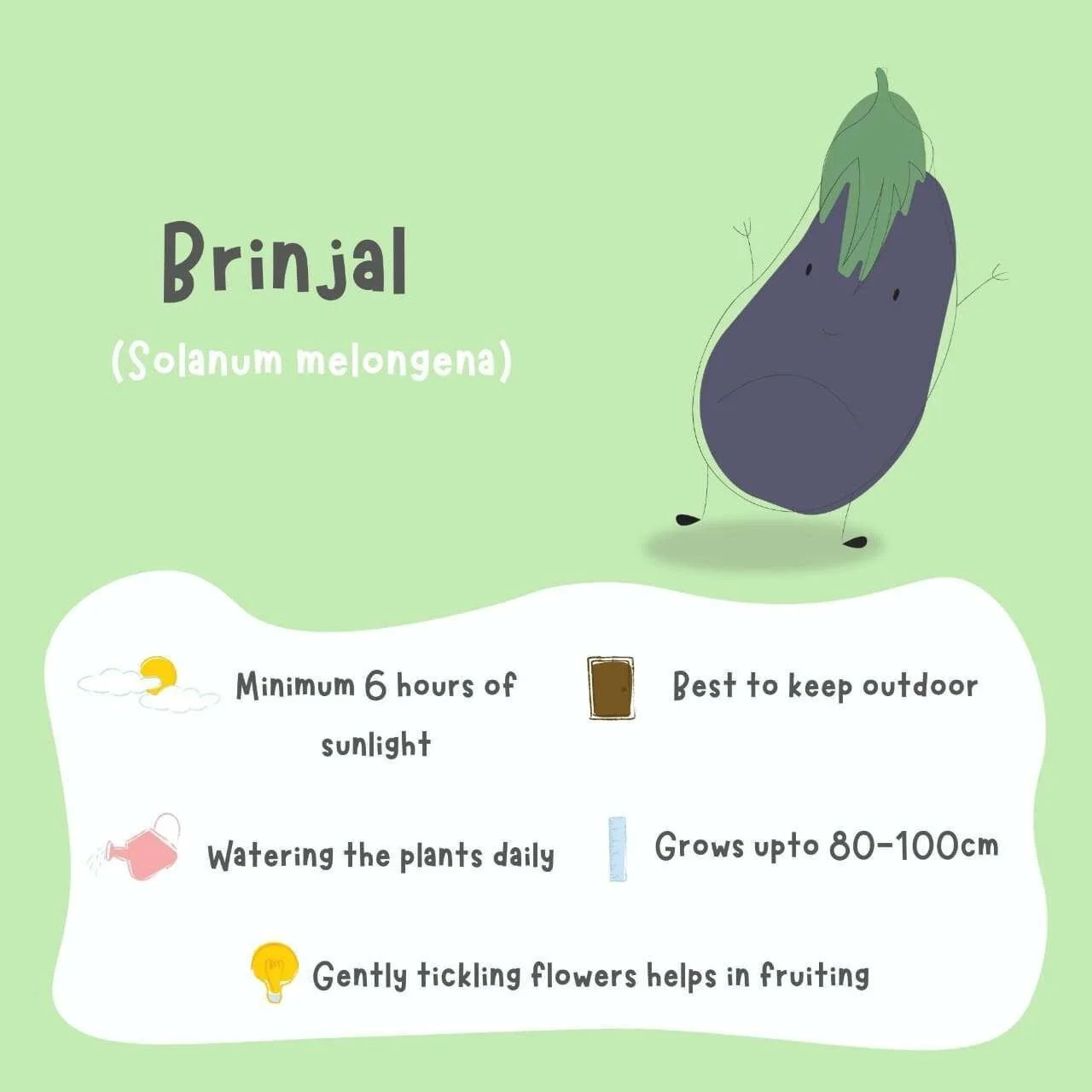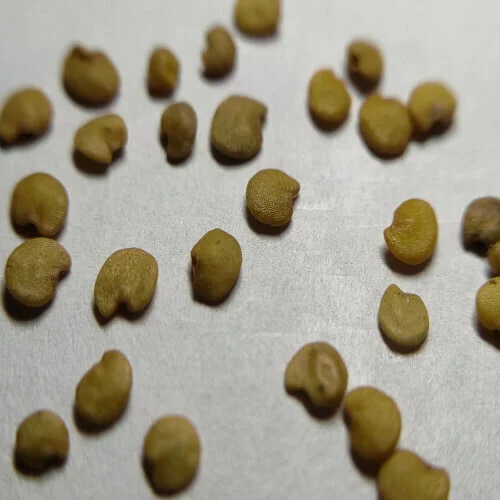Brinjal Seeds (12 seeds)
₹10.0
Brinjal is one of the widely used vegetables across the globe. It is also known as India’s common man’s vegetable and has great health benefits. Brinjal is good for diabetes and a great weight loss partner for weight watchers. In addition to containing a high amount of vitamins and minerals, they contain antioxidants that protect the body from harmful substances. Try our Non-GMO Brinjal Seeds. Also, check out our workshops for more details.
PRODUCT DESCRIPTION
Number of seeds in a packet – 12
PLANT DESCRIPTION
- Difficulty Level – moderate
- Plant Height – 80 – 100 cm
- Type – outdoor
- Feed – Vermicompost for nutrients every week, Seaweed once a month for greener leaves, and Epsom salt for better blooming once a month
- Watering – every day
- Sunlight – full sunlight for minimum of 6 hours
- Germination Time – 1 – 2 weeks
- Fruiting Time – 8 – 9 weeks
- Suitable Temperature – 70°F – 90°F
- Season – summer, monsoon, spring
HOW TO GROW BRINJAL FROM SEEDS
- Take a Seedling Tray and fill it with Cocopeat.
- Make ½ inch deep holes and put 2 seeds in each hole.
- Fill the hole with Cocopeat and spray with water using a spray gun or spray bottle.
- Keep the soil moist not soggy.
- Seeds will germinate within 1 – 2 weeks.
- Full sunlight is needed.
ALTERNATE METHOD
- Take a Medium Size Pot and add a Potting Mix.
- If planting in the soil add Neem Cake Powder, Vermicompost, and Seaweed.
ALTERNATE NAME
Botanical name: Solanum melongena
brinjal seed in hindi: baingan ke beej (बैंगन के बीज)
brinjal seed in tamil: kattari vitai (கத்தரி விதை)
brinjal seed in telugu: vankaya vittanam (వంకాయ విత్తనం)
brinjal seed in kannada: badane bija (ಬದನೆ ಬೀಜ)
brinjal seed in marathi: vangyace bi (वांग्याचे बी)
brinjal seed in malayalam: vazhuthana vithu (വഴുതന വിത്ത്)
Other names: Eggplant, aubergine
You must be logged in to post a review.
Q & A
The sustainability of vegetable seeds can be assessed from various perspectives. Here are some key points to consider:
Genetic Diversity: Sustainable vegetable seeds should promote genetic diversity within plant populations. Genetic diversity enhances resilience to diseases, pests, and environmental changes. It also allows for adaptation and evolution over time.
Open-Pollinated Seeds: Open-pollinated seeds are sustainable because they can be saved and replanted year after year without losing their desirable characteristics. Farmers and gardeners can save open-pollinated seeds from mature plants, ensuring a continuous supply of seeds and reducing reliance on seed companies.
Heirloom Seeds: Heirloom seeds are traditional, open-pollinated varieties that have been passed down through generations. These seeds often have unique flavors, colors, and adaptations to specific regions. By preserving heirloom seeds, we maintain cultural heritage and promote biodiversity.
Organic and Non-GMO: Organic vegetable seeds are produced without synthetic pesticides, fertilizers, or genetic modification. Non-GMO (Genetically Modified Organism) seeds are essential for maintaining natural biodiversity and avoiding potential risks associated with genetically modified crops.
Seed Sovereignty: Supporting local seed systems and seed-saving initiatives contributes to sustainability. When farmers and gardeners have control over their seed supply, they are less dependent on commercial seed companies and can preserve and adapt seeds to local conditions.
Seed Banks and Conservation Efforts: Establishing seed banks and conservation programs helps preserve rare and endangered vegetable varieties. These initiatives ensure that valuable genetic resources are protected and available for future generations.
Sustainable Seed Production: Sustainable seed production involves practices such as crop rotation, organic farming methods, and responsible water usage. It minimizes the use of synthetic inputs, reduces environmental impact, and supports the long-term health of agricultural ecosystems.
Knowledge Sharing: Sharing information about seed saving, traditional farming techniques, and sustainable agriculture practices is crucial for maintaining seed diversity. Communities, organizations, and educational institutions play a vital role in disseminating knowledge and empowering individuals to participate in sustainable seed practices.
By considering these factors and supporting sustainable seed practices, we can contribute to the long-term viability of vegetable seeds and promote a more resilient and diverse food system.
General Inquiries
There are no inquiries yet.





Reviews
There are no reviews yet.